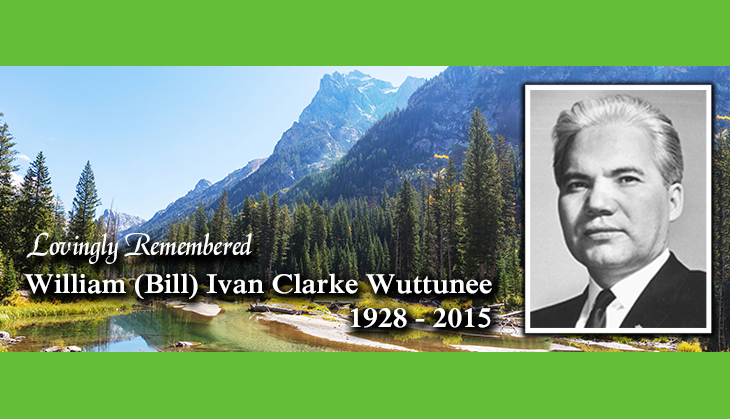
Remembering William (Bill) Ivan Clarke Wuttunee
William (Bill) Ivan Clarke Wuttunee (JD’52) passed away peacefully with his family by his side on Oct. 31, 2015. The following retrospective on Wuttunee’s life was shared with his colleagues and friends across the college by Acting Dean Beth Bilson.
As a young student, William Ivan Clarke Wuttunee’s academic capacity and leadership skills stood out. In recognition of his academic achievement and potential, Wuttunee was awarded a scholarship from McGill University, received a law degree from the U of S, and was called to the bar as the first native lawyer in Western Canada.
This inaugural appointment was one in a series of significant achievements for this pioneer.
“William’s decision to be a trailblazer of this kind was a courageous one,” said Acting Dean Beth Bilson. “And subsequent generations of law students have a lot to be grateful to him for.” Today, Bilson noted that we have 47 self-identifying Aboriginal students at the U of S.
Wuttunee’s remarkable journey began on the Red Pheasant First Nation, a small reserve near Cando, Saskatchewan. He was born and lived there until he was 12, when he was forced to leave his family to attend residential school. Years later, he returned to the reserve.
In 1943, his family moved to Battleford, where Wuttunee attended high school. In 1948, he was awarded a scholarship to attend McGill University. He made his way to Montreal by freight train and became one of two native people to attend university in Canada at the time. He then returned to Saskatchewan and obtained his JD from the UofS in 1952.
After being called to the bar in 1954, Wuttunee began his law practice with the Saskatchewan Government Insurance Office. There, he was known for his passion and dedication to the advancement of native rights and independence. In 1958, Wuttunee became a member of the Saskatchewan Provincial Committee on Minorities, chaired by Premier T.C. Douglas. While serving as a committee member, he travelled to every reserve in Saskatchewan to lobby chiefs to support movements to acquire the right to vote. In addition, he organized a meeting of chiefs in Fort Qu’Appelle for that purpose, which resulted in the creation of the Federation of Saskatchewan Indians (now the FSIN.) Shortly after, T.C. Douglas introduced legislation extending the right to vote to status Indians, which was also enacted by the federal government in 1960.
Wuttunee’s dedication to the realization of self-determination united Aboriginal peoples nationwide. In 1959, he appeared before the Joint Committee of the House and Senate on Indian Affairs as counsel for the Federation to put forward the idea of First Nations as a third order of government. In 1961, he co-founded the National Indian Council (NIC) and was appointed its first National Chief. The NIC was credited for being the first organization to unite “the political voice of Aboriginal peoples at a national level.” Today, it is known as the Assembly of First Nations.
In 1963, Wuttunee moved to Calgary, Alberta and opened a general practice. He later opened up a satellite office in Yellowknife. His practice focused primarily on criminal law. Of note, was his role as counsel for the last Canadian citizen prosecuted for homosexuality. He practiced law until the 1980’s.
Wuttunee was also the first native lawyer to appear before the Supreme Court of Canada. Other significant achievements throughout his distinguished career include: authoring the controversial book, Ruffled Feathers: Indians in Canadian Society in 1971; sitting on the Oversight Committees for the Truth and Reconciliation Commission and the organization overseeing the thousands of residential school claims from 2007 to 2010; and, receiving an apology from Pope Benedict at the Vatican for the harms “perpetrated against native children in residential schools.”
Wuttunee was a residential school survivor, a Canadian military officer, an advocate, and an activist who dedicated his life to the betterment of the lives of Aboriginal peoples across Canada.
